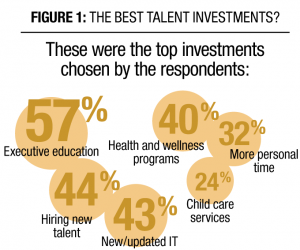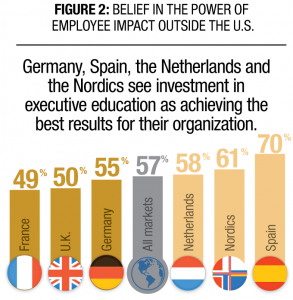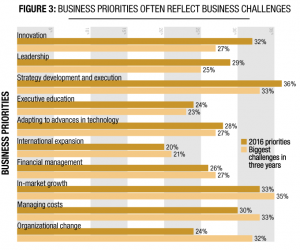 Executive education is the way to go if an organization wants to improve its business prospects, according to a majority of companies polled in the “Corporate Learning Pulse” study released in May 2016.
Executive education is the way to go if an organization wants to improve its business prospects, according to a majority of companies polled in the “Corporate Learning Pulse” study released in May 2016.
The study, published in London by Financial Times and IE Business School Corporate Learning Alliance, asked more than 600 business leaders and learning and development specialists responsible for influencing, planning and delivering executive development programs in small, medium and large organizations in the U.K., France, Germany, Spain, the Netherlands, Norway and Sweden, how they measure change, and which talent investments rank highest for the learning and development community and the senior C-suite executives who hold them to account. Results from this attitudinal survey also came from randomized questions on investments in employees that improve business outcomes.
According to the research, nearly three-fifths of respondents — 59 percent — say investing in employees “drives change and innovation” in their businesses, rising to 65 percent among C-suite respondents.
Some investments (Figure 1) are more strategic than operational, such as hiring new talent and IT systems investments. However, the survey showed that 57 percent of companies believe investing in the development for existing executives is the top investment an organization can make to improve their business prospects. This compares with 44 percent who are in favor of hiring new talent.
The belief that employees are change agents for innovation is strongest among senior professionals working in Spain, the U.K. and Germany. Further, Spanish professionals feel most strongly that corporate learning programs achieve the desired results for their organization. From senior managers upwards, belief in the power of employees is strong, and strongest among those in the C-suite.
While more than half of survey respondents believe senior leaders understand the value of corporate learning, slightly less than half (47 percent) believe it has had a positive impact on their organization. Surprisingly, a similar number (46 percent) say their organization’s senior leaders see no added value in previous executive education programs because their outcomes are hard to measure.
When examining views according to seniority, the data show notable variances. For instance, the most senior respondents — C-suite, presidents and managing directors — believe that corporate learning has had a positive impact on their organization, and that past investments were worthwhile. However, fewer senior learning and development professionals who are more focused on day-to-day operations within their organizations agree.
Taken at face value, this data might suggest that senior managers see less value in executive education. However, it could be the opposite. Senior managers, especially those in the trenches, may be keener than ever to find learning programs that help organizations achieve their goals and objectives. The challenges they say they face — including effective executive education — demonstrate their business priorities over the next two to three years. (See Figure 3.)
The corporate learning sector’s real challenge is well illustrated by one key finding: 47 percent of survey respondents fail to see how corporate learning investments add value to their bottom line. Where they do see the link, organizations are most likely to gauge the impact of their investment in two areas: employee satisfaction and engagement. Further, organizations surveyed have at some point sought to measure corporate learning impact on:
- Employee satisfaction and retention (74 percent of respondents).
- Employee engagement (73 percent).
- Customer satisfaction (69 percent).
- Revenue and profit (64 percent).
These findings sound a clear call to action for learning leaders: Close the gap between expectations and reality by improving how learning impact is measured against performance.
Ana Sanchez Linares is director of programs at Financial Times and IE Business School Corporate Learning Alliance. Comment below, or email editor@CLOmedia.com.














